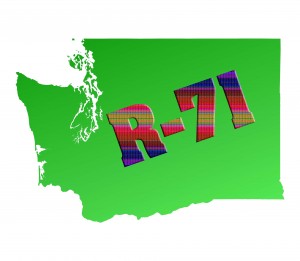Doe v. Reed: Appeals Court upholds R-71 petition releases
 The 9th Circuit Court of Appeals has rejected a challenge to Washington’s policy of releasing initiative and referendum petitions, specifically the Referendum 71 signatures submitted to force a public vote on the “everything but marriage” law three years ago.
The 9th Circuit Court of Appeals has rejected a challenge to Washington’s policy of releasing initiative and referendum petitions, specifically the Referendum 71 signatures submitted to force a public vote on the “everything but marriage” law three years ago.
Secretary of State Sam Reed said he was pleased with the decision and that it honors the state voters’ commitment to the Public Records Act and transparency in government. Reed said he hopes the challengers will let the decision stand, now that the U.S. District Court and the Circuit Court of Appeals have ruled in the state’s favor. Reed’s comment:
“We believe Washington residents expect open and accountable government, and it was the voters themselves who gave us our strong Public Records Act 40 years ago this year,” Reed said. “I am happy that disclosure of petitions has been without incident, and that the initiative and referendum process is alive and well, with no apparently ‘chilling’ of the process we hold dear. I am glad that we are having civil debate this year over same-sex marriage and other difficult issues. We can disagree agreeably.”
This is the Centennial of the voters approving the initiative, referendum and recall process in Washington.
R-71 passed in 2009 with a 53 percent approval vote, upholding a new law the Legislature had passed for gay and lesbian, and elder, domestic partners. For months, the state was blocked from releasing petitions that were collected by opponents to force the public vote three years ago.
Reed, represented by Attorney General Rob McKenna, secured a strong 8-1 U.S. Supreme Court ruling in 2010 after Protect Marriage Washington sought to keep the R-71 petitions secret because they feared retaliation for signers and viewed it as violating their “anonymous free speech” rights. Reed and McKenna said the state has a right to pass open-government laws and to permit public release of public documents, and that no one’s constitutional rights were being violated.
Reed and McKenna said citizen legislating by initiative and referendum is a public process like the Legislature and that petitions have never been exempted from the Public Records Act. Petitions are part of legislating, and not secret like voters’ ballots, they said.
The high court ruled that public release does not, as a general proposition, infringe on First Amendment rights, but did hold out the possibility that foes could file an “as-applied” challenge on a particular measure. That’s what happened in U.S. District Court in Tacoma, where Judge Benjamin Settle upheld disclosure. The losers appealed and now that has been rejected.
Appeals Judge A. Wallace Tashima, writing the main opinion today, said the case is essentially moot, since the state already released the petitions months ago. In a separate concurrence, Judge N.R. Smith said the state could have been ordered to stop continuing to releasing the R-71 petitions, but that the challengers hadn’t made their case.
Smith quoted Justice Scalia’s comment in the original Doe v. Reed case that “Harsh criticism, short of unlawful action, is a price our people have traditionally been willing to pay for self-government.” Smith said challengers failed to show any actual harm that would befall signers whose identifies became known by continued disclosure. Smith called disclosure a “fairly modest government action,” and that challengers had provided no current examples of harassment or of police ignoring threats.